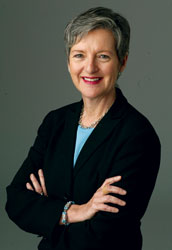Journalistic Puzzle Master
When something is amiss, Diana Henriques puts on her game face.
The
New York Times journalist and Elliott School
graduate, BA ’69, uncovers financial fraud
and corporate scandal by fitting together the
pieces of a free-press puzzle. She recognizes
patterns. She reveals anomalies. She looks for
a curious shift.

|

Diana Henriques
is an award-winning New York Times reporter
who says GW gave her insight into the
world she would cover.
|
“In journalism, you have to watch where
the power is flowing and go from there,”
Henriques says. “Revealing the truth is
like solving the world’s largest crossword.”
Henriques, a financial investigative reporter,
has used her problem-solving skills to expose
major white-collar crimes over the past three
decades, earning her prestigious reporting awards
and several Pulitzer Prize nominations.
Her education and experiences at The George
Washington University, she says, armed her with
the confidence to break barriers in the field.
At a time when many women journalists secluded
themselves to the cozy corners of newsroom feature
sections, Henriques refused to settle for anything
but hard-hitting coverage, even in the often-complicated
financial world.
For Henriques, it’s all about playing
the game and playing it right.
“From the beginning, she has had an ongoing
outrage at injustice,” says Jaye Scholl,
a former colleague of Henriques’ at The
Trenton (N.J.) Times. “And it didn’t
matter what the subject was—it could be
health, politics, science—she has always
had this laser-like focus on what was amiss.”
As a New York Times reporter for
the past 18 years, Henriques and her investigations
into the world’s wrongdoings have helped
prompt significant change.
Most notably, her 2005 in-depth series that
examined the fleecing of young soldiers by insurance
and investment companies led to congressional
hearings and regulatory reforms.
Because of the articles, thousands of service
members received cash restitution from companies
that had been defrauding them for years.
In the world of amending financial misconduct,
progress was made.
Henriques says she has always been drawn to
the position of watchdog—an intuitive
skill that grew during her time at GW.
Henriques came to the University in the late
1960s looking to expand her knowledge on the
world she would be covering. The Bryan, Texas,
native studied international affairs at GW and
thrived. Henriques grew as a journalist, she
adds, at The GW Hatchet during a time
when peace marches and political demonstrations
in Washington were making national headlines.
In the hustle and bustle of the nation’s
capital, Henriques confirmed what she knew since
age 13: She was a journalist.
“From the second I stepped into a newsroom,
I fell in love. I loved the way they smelled,
the way they sounded, and the kind of work you
could do,” Henriques says. “To this
day, journalism has never disappointed me.”
Reporting jobs at several New Jersey newspapers
after graduation helped Henriques hone the skills
she would eventually show off at The Philadelphia
Inquirer’s Wall Street Bureau in
the early to mid-1980s.
It was there—when skyrocketing oil prices,
inflation, and the lure of big business were
making headlines—that she found her true
calling, she says.
“I felt the center of gravity shift toward
the business world in the 1980s, when it was
becoming increasingly influential. Even cab
drivers were experts on current interest rates,”
she explains.
Henriques joined Barron’s National
Business & Financial Weekly in 1986
to tackle the broader financial scene, from
investor frauds to market shareholders abuse.
It was later, though, at The New York Times
that Henriques really fused her investigative
skills with her financial knowledge, resulting
in exploratory pieces and the legs for two of
her three books.
Harry Harding, former dean of the Elliott School,
recruited Henriques in the mid-1990s to the
school’s International Advisory Council,
where she currently serves as chairwoman.
Harding says it is Henriques’ curiosity
with the world at large that makes her one of
the most esteemed investigative reporters, and
a model alumna.
“Journalism is like any kind of research.
It’s about getting an interesting topic
and asking the right questions about it,”
Harding says.
Henriques has covered everything from the explosive
growth in the world’s gold supply to how
wealthy Americans could legally sidestep taxes.
She has won numerous, prestigious accolades.
And she has recognized her place in history,
as she reported on—and cried with—those
who had lost loved ones or employees in the
felling of the World Trade Center.
“I had a clear sense that what we were
doing wasn’t just journalism; we were
bearing witness,” Henriques says of the
days following Sept. 11, 2001. “One hundred
years from now, people will look at those reports
when they are trying to find out what happened.”
Henriques, who lives in Hoboken, N.J., with
her husband, Larry, of 37 years, most recently
completed a six-part series exploring the current
status of church-state relations for The
New York Times.
The avid reader and senior warden at her church
says she’s always finding something new
that interests her; something she wants to engross
herself in; something that just doesn’t
seem right and needs some attention.
What will tomorrow bring?
“The nature of an investigative journalist
is that I don’t know,” Henriques
says. “That’s the fun of it.”
—Jaime Ciavarra